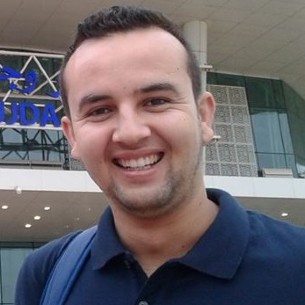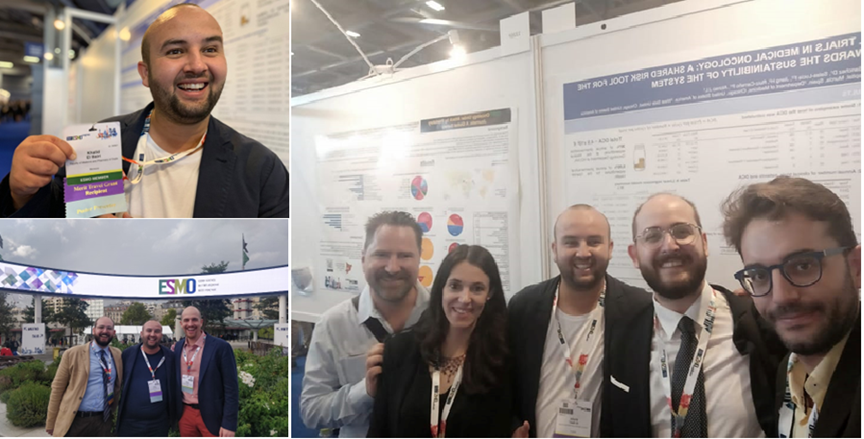 By Khalid El Bairi, MD
By Khalid El Bairi, MD
Read Part 1, Part 2, Part 3, and Part 4.
Have Courage
Young investigators may find that conducting oncology research in under-resourced settings can be challenging, but don’t be afraid of the pain points. Have courage and be the change in your setting.
Advancing in research in low- and middle-income countries (LMICs) may be associated with “success toxicity.” As junior cancer researchers progress well in their projects, they may encounter some stereotyped and hierarchical mindsets from colleagues and senior researchers who find it difficult to accept a younger colleague’s advances. Personally, I was sometimes seen as an enemy by other researchers because of my team’s progress on our research project and my public talks on sensitive issues such as plagiarism, publishing in predatory journals, and other problems related to scientific integrity.1 In addition, I did not receive much encouragement from my institution, which is the affiliation of most of my published papers, including those in journals with high impact. It is frustrating to feel the lack of institutional support when publications by junior doctors help universities gain good ranking and visibility internationally.
For young investigators in LMICs, our important achievements come at a high cost—to our health, wellness, and our professional and personal relationships. Deep unhappiness can markedly be seen among junior scientists in these settings who worry about their unclear future in research and academia. Across LMICs, there is a trend toward minimizing the impact of junior researchers because of toxic hierarchy, particularly when senior researchers in that setting have built their careers through publishing in predatory journals. I have personally been told that as a junior doctor, my research has no impact, and that I am too young to do this work.
Those of us pursuing this path in this environment must take the words of James Fraser Stoddart, 2016 Nobel Laureate in Chemistry, to heart: “Be prepared for early criticism.” In my strong opinion, young cancer researchers should always reject stereotypes based on toxic hierarchy and continue their passion for research. In my case, I have doubled my efforts to complete the first steps of our project. Turning this negative state into positive progress was a milestone in my career as a medical trainee. Driving outstanding cancer research should get oncologists focused on their goals, not other people’s goals. Young scientists suffering from similar concerns have to continue their path for achieving scientific success—after all, the fight is with cancer, not with each other.
Don’t Be Discouraged
“We regret to inform you that your project was not of high priority for funding.”
I have received this kind of decision several times, and I’m sure many of you also know the feeling. Getting funding from international organizations is highly competitive and sometimes, despite the excellence of your research proposal, these funds are awarded to other researchers. Funding cancer research in LMICs in particular is a tangible challenge. Limited opportunities are available for young scientists in these settings—they are literally under-resourced. Therefore, to proactively address these rising issues, young researchers should also be ready for bad news and prepared on how to manage these matters. During the early phases of OVANORDEST study, I self-funded the development of several activities, including training, travel to scientific events, publications, etc., to advance the project. This was a salvage solution that kept our project afloat until finding other funding alternatives, but it was not ideal. Young researchers in under-resourced settings have to always think about a plan B to fund their individual research.
Despite initial funding setbacks, I kept going because I strongly believed that the lack of funding for my project and the limited scholarships was a transitional stage. After improving my international visibility and CV, I entered a new optimistic phase where I had the opportunity to make successful proposals to obtain travel grants. Very recently, I received a Merit Award to participate in the annual congress of the European Society for Medical Oncology (ESMO) in Paris in September 2022 (photos below) where my co-investigators and I presented the results of our global study on the raising concern of predatory journals in oncology. Indeed, predatory publishing is a remarkable issue in global oncology and we were able to identify risk factors that may be targeted by educational interventions.2

Dr. El Bairi (top left) with co-investigators of a global study on predatory publishing in oncology (bottom left and right) at the ESMO 2022 Congress in Paris in September. The study recieved a Merit Award.
In addition, I got another ESMO travel grant to participate in the Molecular Analysis for Precision Oncology Congress to be held in Amsterdam later in October. This will be a promising forum to discuss the findings of our OVANORDEST-1 study on the use of affordable cancer biomarkers to predict patient outcomes in women with ovarian cancer.3
My own career transition demonstrates that the lack of opportunities for early-career scientists in LMICs is not a permanent state. Young oncologists from similar setting should keep their optimism high and work hard to improve their CV to take advantages of opportunities for funding support in the future.
Create Your Own Path With the Resources You Have
In 2015, after a competitive selection process, I was accepted in the Harvard Medical School’s Cancer Biology and Therapeutics Program. Unfortunately, I could not participate because of the high tuition fees. Again, there were no funds to support the training, even partially. This bad news has deeply influenced my decisions and I’ve convinced myself that I can build a “Harvardian career” here in Morocco without being enrolled in a Harvard program.4 In Morocco, unlike many other countries, research training is not included in the curricula of medical studies and there are no combined MD/PhD programs. In fact, Moroccan medical trainees have few opportunities for participating in research projects. I have sacrificed three years of medical school to develop the required training for a career in clinical research. I’ve organized my medical career to make research on cancer my top priority, to limit the gap in the number of skilled clinicians in this field in our setting. To date, I do not regret choosing this individually planned career and I strongly recommend it for those who have courage to blaze their own trail.
Dr. El Bairi is a research associate in the Department of Medical Oncology at Mohammed VI University Hospital, in Oujda, Morocco, and he is preparing for a career in medical oncology. He joined the ASCO Trainee & Early Career Advisory Group as a member for the 2022-2023 term. The contents of this paper reflect the author's perspective and not that of his institution of affiliation. Follow Dr. El Bairi on Twitter @elbairikhalid19. Disclosure.
References
- El Bairi K. Fighting Predatory Journals in Africa: The Tale of a Young Moroccan Scientist. PMJ Blog. May 26, 2021.
- El Bairi K, Trapani D, Nidhamalddin, et al. 1326P Oncology under attack by predatory journals: A global survey. Ann Oncol. 2022;33:S1149.
- El Bairi K, Al Jarroudi O, Afqir S. Ovarian cancer in Morocco: Time to act is now. Gynecol Oncol Rep. 2021a;37:100857.
- El Kefi S, El Bairi K. Two Early-Career Cancer Researchers From Africa Aim to Make a Difference and Never Give Up. The ASCO Post. July 25, 2022.


Recent posts